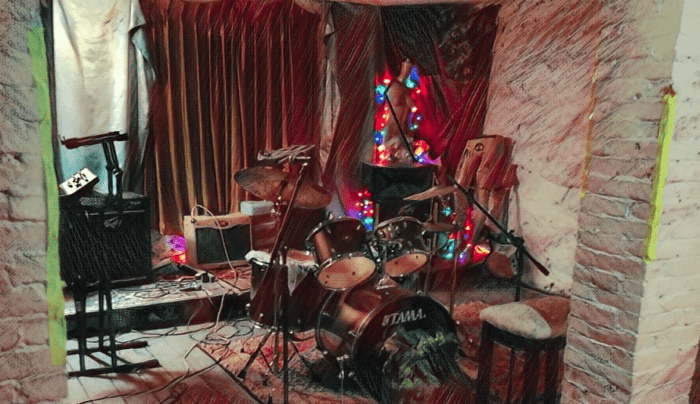
The Tourist Trap has gone back to just being a basement again.
With Berklee College of Music, Longy School of Music, and the New England Conservatory of Music all in the area, Greater Boston is a magnet for young musicians aiming to make their mark. Before the pandemic began, many students at these schools living off-campus would throw concerts at their houses, with living rooms and basements transformed each weekend as local bands took to makeshift stages and fans streamed in through the kitchen. Word of these intimate shows often spread by word of mouth, creating an enthusiastic community of Boston bands and fans.
While much focus has been placed on the closures of large concert venues, the pandemic has significantly influenced the DIY scene as well. One Allston house venue in particular, the Tourist Trap, was gaining real traction just before the lockdown began. In separate interviews, two residents of the venue describe the way the pandemic has impacted their space and the DIY scene as a whole. Leonard is a senior at Berklee, and Shelton attended Berklee from 2017 to 2018. They are both musicians—Leonard provides vocals and plays bass with Superblush, and Shelton makes rock music that responds to police brutality.
Leonard: We were looking for places to live [in] 2019. … A few other people were like, Hey, there’s a cool house available. And also it’s right on the top of the hill. It’s perfect in the basement when we were touring it, there’s a stage built already into the house. Whoever had lived before had put it together … you have this kind of slightly-raised wooden stage. So we tried our hardest and got it.
Shelton: We brought our amps and instruments in there. And for a while, it was just kind of a jam kind of vibe. But a couple of months later, we started having the shows. … The stage was already there. We just painted it, put up some like curtains and blankets and stuff like soundproof[ing] [to] dampen the sound a bit. And then, yeah, it was already kind of set up.
Leonard: I forget who came up with the name the Tourist Trap. After setting up shop, it took a little while to draw audiences. [We] used Instagram, word of mouth, and quality lineups to establish [a] presence on the house venue scenes.
Shelton: The first few shows we had, we tried to get like some not bigger names, but, you know, like, some hype shows going to kind of get some hype and then [audiences] kind of just came naturally because everyone’s just trying to see some live music. Other shows would end and then they’d say, Well, go over to The Trap.
Leonard: People knew of us, but we were still new. So it was a strange thing of trying to convince people to come to the house as opposed to other places. A part of that was, you know, [inviting] people that we know, knowing that that they like us at the house, [and] the bands we’re choosing. One of the great parts about having a house venue is really going to tailor your sets and really get to expose artists that you like.
For a few glorious months, the Trap was throwing well-attended shows, and bands were flooding its Instagram account asking to play a gig. Then, there was the last show before lockdown.
Shelton: Two or three months before COVID hit, I’d say we were doing really well. We’re having some awesome, really fun shows. It was getting packed … we probably had one or two shows a week and there were three or four bands every night. It was a great way to experience new music and just, you know, seeing people go crazy, having fun is always, always a good time as well.
Leonard: It was so good. You know, there are a lot of good shows, but that [last] show, in particular … there [were] a lot of people there that weren’t normally there. We were getting to the point where people would just like show up even if they didn’t know who was playing, they would just, like, show up at the house and expect the show to be going on. And we did two shows a week or weekend normally so people could just show up and find a show. But I mean, that performance was brilliant. I had such a good time. We played really well. And my brother came and it was just like a really big moment for me just because I had people who hadn’t seen my band before playing, we really killed it.
On the current state of the DIY scene …
Leonard: Since [lockdown] … to put it frankly, people have either left and the houses are no longer, you know, house venues, and the bands that made up the scene, a lot of them are gone, too. Even professional venues are just getting obliterated by this. So it’s … it’s concerning for sure. But even the spirit of playing in the basement now has been just totally, you know, uprooted. It’s pretty sad, but what can you do?
Shelton: Once COVID hit, it was a very abrupt and jarring change to the house dynamic.
One cool thing about it is that everyone has had a lot of time to get recording and stuff, like, so many people are just releasing music, releasing music. But in general, it is not the same.
Babi Oloko hails from new New Jersey and is currently pursuing a BA in literature and art history at Harvard University. She writes art reviews, personal essays, and fiction pieces for various publications. You can find more of her writing in the Los Angeles Review of Books, the Harvard Crimson, and Unpublished Zine.

